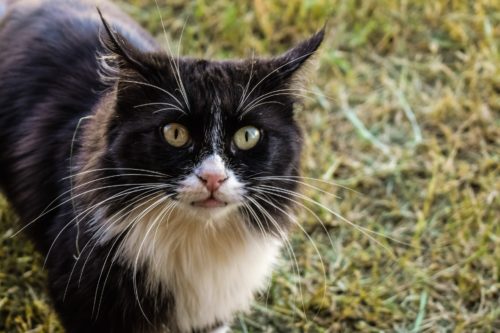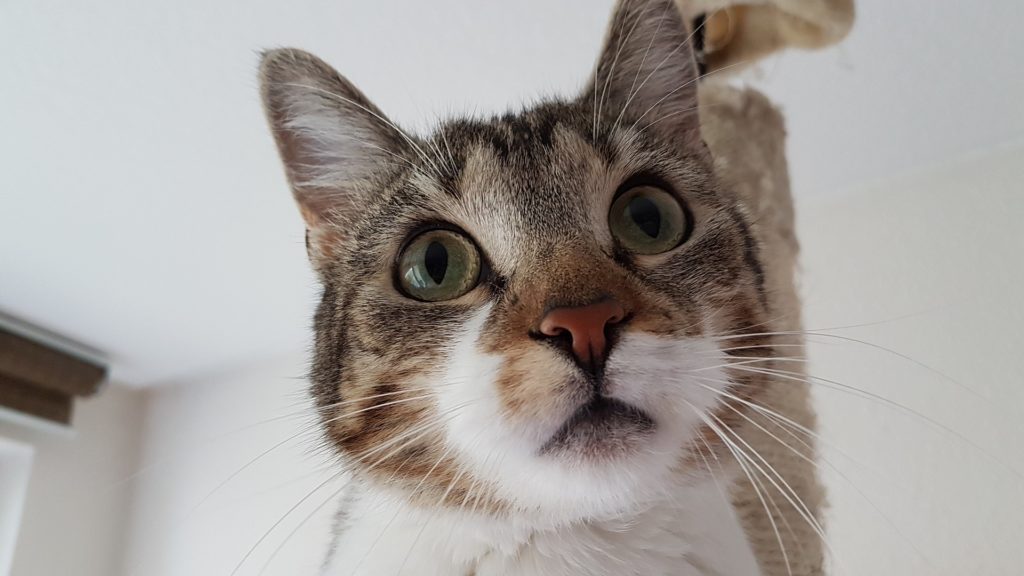As the third most common type of feline allergies behind flea bites and inhaled substances, food allergies in cats are nothing to sneeze at.
Food allergies in cats are often accompanied by itchy, irritating skin problems, with 10 to 15 percent of affected cats suffering from gastrointestinal symptoms like vomiting and diarrhea.
Unlike allergies to flea bites, food allergies do not develop overnight — rather, they tend to intensify over longer periods of time.
Read on for symptoms of food allergies in cats, and more, below.
What are the Symptoms of Food Allergies in Cats?

The most common symptoms of food allergies in cats are:
- An increase in itching or scratching
- Diarrhea
- Vomiting
- Flatulence, or abdominal gas
- Pain or discomfort in the abdomen
- Lack of appetite
- Weight loss
- Poor weight gain
- Weak or poor body condition
If you notice these symptoms in your cat, call your vet. A veterinarian will work with you to diagnose, and treat, a food allergy. The longer the allergen remains in your cat’s system, the more severe the reaction could become — even to the point of death.
It’s important to get your cat diagnosed and treated by a veterinarian before eliminating suspect proteins yourself. Doing so could throw your cat’s diet off balance, contributing to more negative side effects.
Food Allergies in Cats: What are They?
Food allergies account for nearly 60% of excessive itching and scratching in cats. A food allergy is the development of a sensitization to certain agents in food. Sometimes referred to as an adverse reaction, a food allergy is defined as an abnormal response to a food or food additive.
There are two types of adverse reactions in cats: food allergies and food intolerance. Food allergies are true allergies marked by the common signs of itching and skin problems. A true food allergy causes the immune system to react and affects various organs in the body. Symptoms of a reaction can range from mild to severe—even life-threatening given enough time.
Food intolerance, on the other hand, is not tied to the immune symptom. It is generally less serious, often limited to symptoms in the digestive tract.
What Causes Food Allergies in Cats?

Food allergies develop over months or years from recurring exposure to the offending food. Referred to as an allergen, the allergy-inducing food item is most commonly associated with protein sources.
And though most people would suspect meats to be the offending protein source, grains and vegetables also contain protein. Meats, grains, and vegetables all have the potential to cause a food allergy in cats.
The most common causes of food allergies in cats are certain types of protein found in most cat foods, including beef, dairy products, and fish. But food allergies aren’t only caused by food. Inflammation, infection, surgery, and some medications can produce food allergies due to damage in the digestive system.
Food allergies affect cats of all ages. Some breeds are more likely than others to develop food allergies, such as Siamese cats.
How are Food Allergies in Cats Diagnosed?
If you suspect your cat has a food allergy based on the aforementioned symptoms, call your veterinarian. He will want to know a detailed history regarding your cat’s diet. Diagnosing reactions to food can prove difficult, as a number of health issues produce similar symptoms.
Common tests include complete blood count and biochemistry profile tests, and urinalysis. However, these tests are not always reliable, their results showing normal if no underlying disease is present.
The most accurate way to identify, and treat, a food allergy is through an elimination diet. An elimination diet involves the removal of suspected allergens in order to test your cat’s reaction to different protein sources.
In order to identify the allergen, your veterinarian will work with you to create a new diet. Typical diets include home-cooked meals or alternative protein sources. With the introduction of a new diet, symptoms, if related to food, will typically improve within a few days. When this happens, your veterinarian will try to identify the allergen by slowly adding various ingredients back into the diet until symptoms develop.
Caring for a Cat with Food Allergies
Food allergies are not curable, but symptoms usually cease with the removal of the allergen from your cat’s diet. By working with your vet to build a new diet based on discovery of the allergen, you can be sure to help build a happy, healthy lifestyle for your cat.




